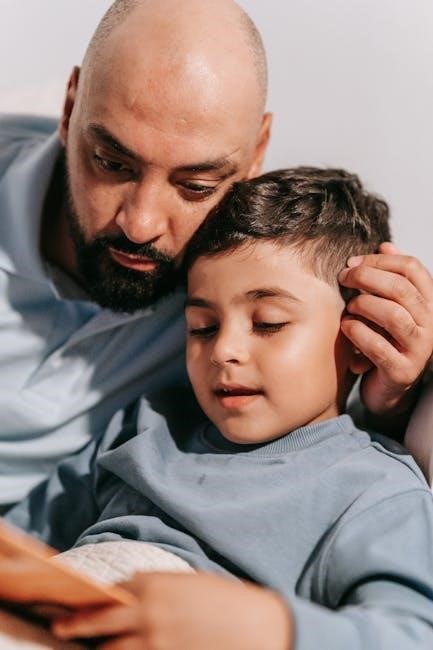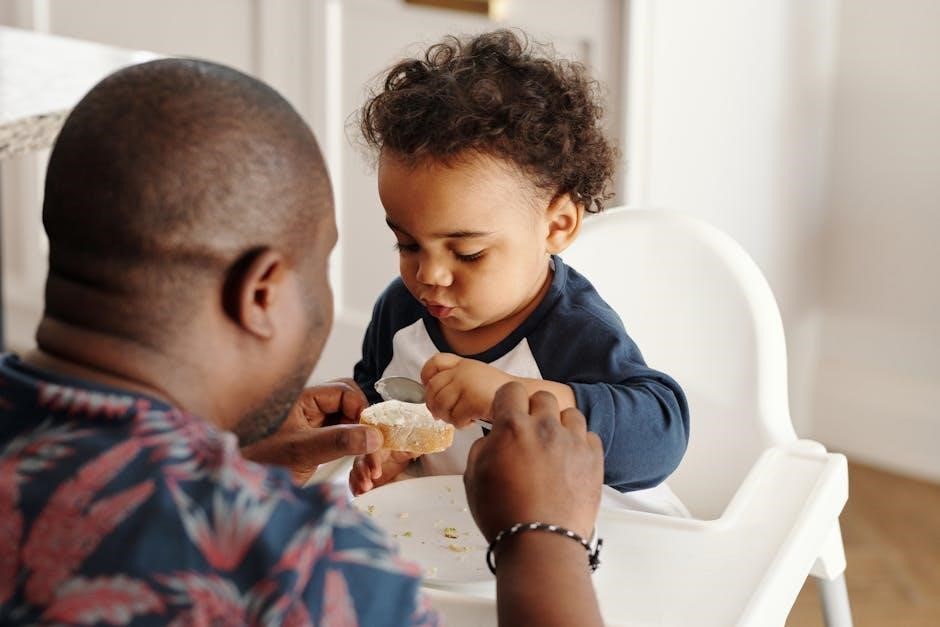Welcome to the Lessons in Love Guide, your roadmap to navigating the complexities of love, relationships, and personal growth. Discover how empathy, communication, and self-awareness shape meaningful connections.
Understanding the Importance of Love and Relationships
Love and relationships are fundamental to human well-being, fostering emotional growth and connection. They teach us empathy, compassion, and how to understand others’ needs. Healthy relationships provide support, trust, and a sense of belonging, while unhealthy ones offer lessons in resilience. Love, in its many forms, helps us grow personally and emotionally, shaping who we are and how we interact with the world. Understanding its importance allows us to nurture meaningful bonds and build a fulfilling life. This section explores how love and relationships impact our lives and why they are essential for personal development and happiness.
Setting Realistic Expectations for Romantic Partnerships
Setting realistic expectations is crucial for building a healthy and lasting romantic partnership. Idealizing a partner or relationship often leads to disappointment, as no one can meet perfection. Understanding that relationships grow over time and require effort from both sides is essential. Avoid expecting your partner to change fundamentally; instead, focus on shared growth and mutual respect. Healthy partnerships thrive when both individuals maintain their individuality while nurturing their connection. Unrealistic expectations can lead to frustration and dissatisfaction, so it’s important to communicate openly about what you both want and need. By aligning your hopes with the realities of love and relationships, you create a stronger foundation for a fulfilling partnership.

Key Lessons About Love and Relationships
Building strong connections requires empathy, communication, and understanding. Love languages, emotional intelligence, and mutual respect are vital for fostering healthy, enduring relationships.
The Role of Communication in Building Strong Connections
Effective communication is the cornerstone of any thriving relationship. It fosters understanding, trust, and emotional intimacy. By expressing thoughts and feelings openly, partners can avoid misunderstandings and resolve conflicts amicably. Active listening and empathy are crucial, as they allow individuals to connect on a deeper level. Communication also involves non-verbal cues, such as body language and tone, which convey emotions and intentions. Regular, honest conversations help address issues early, preventing resentment from building. When both partners feel heard and validated, they cultivate a supportive and loving environment. Strong communication skills empower couples to navigate challenges together, strengthening their bond and fostering a lasting connection.
Understanding Your Partner’s Love Language
Understanding your partner’s love language is crucial for fostering emotional connection and satisfaction in a relationship. Love languages are the ways people prefer to express and receive love, such as words of affirmation, acts of service, physical touch, quality time, or receiving gifts. Recognizing these preferences allows you to communicate love effectively, meeting your partner’s emotional needs. Misaligned love languages can lead to feelings of neglect, even if love is present. By learning and adapting to your partner’s primary and secondary love languages, you strengthen intimacy, reduce misunderstandings, and create a nurturing environment. This awareness promotes mutual fulfillment, ensuring both partners feel valued and appreciated in meaningful ways.
The Power of Empathy and Compassion in Relationships
Empathy and compassion are essential for building and maintaining healthy, fulfilling relationships. Empathy allows you to understand and share your partner’s feelings, fostering deeper emotional bonds. Compassion takes this further by inspiring acts of kindness and support, creating a safe and nurturing environment. These qualities help partners navigate challenges together, fostering trust and understanding. By actively listening and validating each other’s emotions, couples can resolve conflicts more effectively and strengthen their connection. Cultivating empathy and compassion not only enhances intimacy but also promotes personal growth, as both partners learn to see situations from different perspectives. Ultimately, these traits are the foundation of a resilient and loving relationship, where both individuals feel valued and supported.

The Phases of Falling in Love
Falling in love unfolds through distinct phases, from initial attraction to deep emotional attachment and commitment. Understanding these stages helps navigate relationships with clarity and awareness.
The 10 Stages of Falling in Love
Falling in love is a dynamic process that unfolds through distinct emotional and psychological stages. The journey begins with attraction, where physical or personality traits draw individuals together. This is followed by curiosity, as people seek to learn more about each other. Infatuation often takes over, characterized by intense feelings and a desire for closeness. As connections deepen, vulnerability emerges, allowing individuals to open up and share personal truths. Trust builds over time, fostering a sense of safety and reliance. Commitment marks a significant milestone, where partners decide to pursue a future together. The comfort stage brings stability, while intimacy strengthens emotional and physical bonds. Finally, long-term attachment solidifies the relationship, creating a lasting connection. Understanding these stages can provide insight into the natural progression of love and relationships, helping individuals navigate their romantic journeys with greater awareness and empathy.
From Attraction to Commitment: Navigating Relationship Stages
Every relationship progresses through distinct stages, from the initial spark of attraction to the deep bond of commitment. The journey begins with attraction, where chemistry and curiosity drive connection. As individuals spend more time together, they move into the getting-to-know-you phase, where shared experiences and conversations build understanding. Trust and vulnerability emerge, fostering emotional intimacy. Over time, partners may transition into commitment, a deliberate choice to prioritize and invest in the relationship. Navigating these stages requires communication, empathy, and mutual effort. Understanding these transitions helps individuals embrace the natural evolution of love and partnerships, fostering healthier and more fulfilling connections. Recognizing these milestones can also guide individuals in addressing challenges and deepening their emotional bonds. Empathy and patience are key to thriving through each stage.

Essential Skills for Healthy Relationships
Essential skills for healthy relationships include communication, empathy, conflict resolution, and patience. Setting boundaries and self-love are vital for fostering trust and mutual respect, building strong foundations.
Setting and Maintaining Healthy Boundaries
Setting and maintaining healthy boundaries is essential for fostering respect and emotional well-being in relationships. Boundaries define personal limits and expectations, ensuring both partners feel valued and heard. They prevent over-dependence and resentment, promoting a balanced partnership. To establish boundaries, communicate openly about your needs and listen to your partner’s expectations. Mutual respect is key; boundaries should never be one-sided. Regularly evaluate and adjust boundaries as circumstances change, ensuring they remain fair and realistic. Healthy boundaries also involve protecting time, space, and emotional energy. By prioritizing boundaries, you create a foundation of trust and understanding, leading to a more fulfilling and harmonious relationship.
The Importance of Self-Love and Self-Esteem
Cultivating self-love and self-esteem is a cornerstone of healthy relationships. When you value yourself, you set the foundation for others to value you as well. Self-love teaches you to recognize your worth, ensuring you don’t settle for less than you deserve. High self-esteem fosters confidence, enabling you to communicate your needs and boundaries effectively. It also prevents codependency, allowing you to maintain your identity within a partnership. By prioritizing self-care and personal growth, you create a balanced relationship dynamic. Remember, true love begins with yourself. Nurturing self-love not only enhances your romantic relationships but also empowers you to approach life with resilience and positivity.
Practicing Patience and Understanding in Partnerships
Patience and understanding are vital for fostering resilience and harmony in any relationship. Life’s challenges often test partnerships, and being patient allows both partners to grow together. Understanding each other’s perspectives builds empathy, which strengthens trust and connection. Patience helps navigate conflicts calmly, preventing misunderstandings from escalating. It also gives space for personal development, allowing each individual to evolve without pressure. Cultivating these qualities creates a supportive environment where both partners feel valued and heard. By embracing patience and understanding, you lay a foundation for long-term satisfaction and mutual respect in your relationship.

Overcoming Challenges in Love
Overcoming challenges in love requires resilience, fostering growth through understanding and empathy. Navigating obstacles strengthens bonds, turning hardships into opportunities for deeper connection and mutual understanding.
Learning from Past Relationships
Learning from past relationships is a cornerstone of personal growth and healthier future connections. Reflecting on previous experiences helps identify patterns, misunderstandings, and areas for improvement. Self-awareness gained from past loves can clarify your needs, boundaries, and expectations. Understanding what went wrong fosters empathy and patience, transforming heartbreak into valuable life lessons. Recognizing red flags early and communicating openly can prevent similar challenges in future partnerships. Embracing these insights allows you to approach new relationships with maturity, resilience, and a deeper understanding of yourself and others. By converting past struggles into wisdom, you pave the way for more fulfilling and meaningful connections.
Managing Conflict and Disagreements Effectively
Conflict is inevitable in any relationship, but how you handle it defines its success. Effective communication is key to resolving disputes without harming the bond. Active listening, empathy, and understanding your partner’s perspective can transform arguments into opportunities for growth. Avoid blaming or being defensive; instead, focus on finding solutions together. Time-outs can help calm emotions, preventing escalations. Addressing issues constructively fosters trust and strengthens your connection. Remember, conflicts are not about winning but understanding and compromise. Learning to navigate disagreements with patience and respect builds resilience and deepens intimacy in your relationship.
Understanding and Avoiding Toxic Relationship Patterns
Toxic relationship patterns can undermine trust, intimacy, and emotional well-being. Recognizing signs like manipulation, gaslighting, or emotional abuse is crucial. Healthy relationships thrive on mutual respect, communication, and boundaries. Avoiding toxic dynamics requires self-awareness and a commitment to self-love. Prioritize partners who value your emotional safety and foster growth. Learning to identify red flags early can prevent deeper entanglements. Navigating such challenges often involves setting clear limits and seeking support from loved ones or professionals. By understanding these patterns, you can build healthier, more fulfilling connections and protect your mental health. Remember, relationships should empower, not diminish, your sense of self-worth.

Modern Perspectives on Love
Modern love embraces diversity, mental health awareness, and navigating cultural differences. It emphasizes self-love, avoiding toxic patterns, and fostering meaningful connections in a rapidly changing world.
Navigating Inter-Religious and Cultural Differences in Relationships
Navigating inter-religious and cultural differences in relationships requires open communication, mutual respect, and a willingness to understand each other’s beliefs and traditions. Challenges may arise from differing values, practices, or family expectations. However, these differences can also enrich a relationship by fostering mutual learning and growth. It’s important to find common ground while respecting individual identities. Couples may need to compromise on certain practices or blend traditions creatively. Involving families or seeking guidance from cultural or religious leaders can also help bridge gaps. Ultimately, navigating these differences strengthens empathy, understanding, and the bond between partners, creating a more inclusive and harmonious relationship.
The Role of Mental Health in Building Strong Relationships
Mental health plays a crucial role in building and maintaining strong, healthy relationships. Both partners’ emotional well-being influences communication, empathy, and conflict resolution. Prioritizing mental health fosters trust, intimacy, and resilience. Openly discussing mental health challenges can deepen understanding and connection. Seeking professional help when needed is a sign of strength, not weakness. A supportive partner can be a valuable ally in managing stress or anxiety. By addressing mental health together, couples create a foundation of mutual care and respect, which is essential for a thriving relationship. Recognizing the importance of mental health ensures that both partners can grow individually and together, leading to a more fulfilling and balanced partnership.
Lessons from Celebrity Relationships and Media
Celebrity relationships and media often provide valuable insights into love and relationships. Shows like How I Met Your Mother and reality TV programs highlight lessons on friendship, commitment, and navigating love in modern times. Celebrity couples’ experiences, both successes and failures, teach us about communication, compromise, and resilience. Media also showcases diverse relationship dynamics, such as inter-religious or cultural partnerships, offering practical advice for real-life challenges. While celebrity relationships are not a blueprint for everyone, they inspire reflection on personal values and relationship goals. Learning from their journeys can help us identify healthy patterns and avoid toxic ones, fostering better understanding and growth in our own relationships. Media serves as a mirror, reminding us that love requires effort, empathy, and mutual respect.



